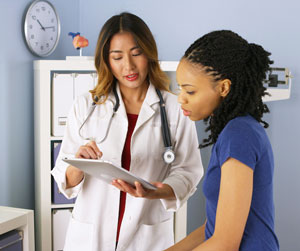 The thought of having your first gynecology exam might be nerve wracking, but it is a straightforward and quick procedure that is an important part of maintaining your overall health. Once you understand the purpose of the annual well woman exam and what it involves, you will realize that there is nothing to worry or be embarrassed about.
The thought of having your first gynecology exam might be nerve wracking, but it is a straightforward and quick procedure that is an important part of maintaining your overall health. Once you understand the purpose of the annual well woman exam and what it involves, you will realize that there is nothing to worry or be embarrassed about.
The purpose of your routine annual gynecology exam is to allow a health care provider to check your female organs to ensure and maintain good gynecological health. The physical portion of the exam takes about 10 minutes and there is a time before and after the exam to ask and answer any questions you and your health care provider might have.
Before Your Well Woman Exam
Women should start receiving annual gynecology exams between the ages of 18 and 21, or when they become sexually active. However, if you are experiencing any gynecological symptoms, you should schedule an exam sooner. Such symptoms include irregularities in the menstrual cycle, unusual or severe vaginal or pelvic pain, abnormal vaginal bleeding or discharge, swelling, tenderness, sores, lumps, or itching, or unusual changes in the breast.
When making your first appointment, it is helpful to tell your gynecologist that this is your first gynecological exam. Your health care provider knows that many women feel nervous about gynecology exams, and they will help you to relax and understand the process. It is also perfectly acceptable to have a female family member or friend accompany you during your appointment and, if you would prefer, you can always request an additional nurse chaperone.
Otherwise, there is not much you have to do to prepare for a pelvic exam. Do not douche, use vaginal creams or have sex for 24 hours prior to your well woman exam, and if you have your period during the time you are supposed to have your exam, you will need to reschedule.

What the Gynecological Exam Includes
The physical exam includes a urine sample, an external and internal pelvic exam, pap smear, and a breast exam.
Pelvic Exam
The pelvic exam in your gynecological exam is comprised of four main steps: the external genital exam, the speculum exam, the Pap Smear test and the bimanual exam.
For the exam, you will lie on the examining table in a dressing gown with your legs in stirrups or knee rests and a sheet is draped over your legs for your personal privacy. Once you are comfortable, your gynecologist will ask you to spread your knees apart. At this point, try to relax as much as possible. Breathe deeply and do not tense your muscles. This is will make the exam less painful and more efficient. Rest assured that if you have requested the company of a friend or family member or chaperone, that they will be asked to stand at a location that preserves your personal privacy.
During the external genital exam your clinician will visually examine the vulva and labia. They are checking for abnormalities, such as irritation, swelling, redness, cysts, or any visual indication of sexually transmitted diseases (STD).
After the external examination is concluded, a sterile medical device called a speculum will be inserted into the vagina. This is not painful but may feel a little cool. Once in place, the speculum is opened slightly to separate the walls of the vagina so that the cervix can be examined. You may feel pressure or brief discomfort at this point, but remember, if you stay relaxed, this part will be easier, and always communicate with your health care provider concerning your level of comfort.
When the speculum is opened, your cervix will be examined. The clinician is looking for signs of irritation, atypical discharge, or indications of sexually transmitted disease. With the speculum still in place, your health care provider will continue with the Pap Smear test.
Pap Smear
A Pap Smear checks for precancerous or cancerous cells. This is a quick procedure that involves taking a sample of your cervical cells and testing them to verify that they are healthy. It will feel like a strong pinch. This annual test is very important and it is necessary even if you are not experiencing any symptoms and do not have any personal concerns. However, you will not know the results of the Pap Smear test at your appointment. The cell sample has to be sent to a laboratory where it is carefully examined. Your results will take a few weeks to get back to you.
After the Pap Smear test, your health care provider will remove the speculum and perform a bimanual exam to check the health of your ovaries and uterus. This portion of the exam involves inserting a gloved and lubricated finger in to the vagina with one hand. With the other hand, they will press down on your stomach. You will feel pressure and some light discomfort is possible, but again, always tell your gynecologist how you are feeling throughout the examination.
Breast Exam
The breast exam is brief and painless. Your health care provider will manually palpate your breast, feeling for lumps, thickening, or discharge. They will also teach you how to give yourself a personal breast exam.
Urine Sample
You will be asked to provide a urine sample. Urine is used to check for kidney health, various infections, and pregnancy.
Q&A with Your Gynecologist
As part of your exam, you will be asked questions about your family history, current health, and sexual activity. You can also expect to be asked questions about your menstrual cycle, sexual activity and partners, contraception, STD prevention, pregnancies, illnesses, surgeries, and drug and alcohol use.
Some of these questions will be quite personal in nature but it is important that you answer honestly. Do not let shyness be a health risk. You should have complete confidence that what you say is kept confidential.
Your annual gynecological exam is also a time for you to ask any questions that you may have. There are no wrong questions to ask when it comes to your personal health and the more knowledge you have about your body, the more confidence you can have about taking care of it.
If you have any questions about what to expect at a gynecological exam or would like to schedule your annual well woman’s exam, please contact Kansas City ObGyn today at This email address is being protected from spambots. You need JavaScript enabled to view it. or 913-948-9636.
Dr. Crystal M. Newby, MD is a physician at Kansas City ObGyn. She received her medical degree from the University of Missouri - Kansas City School of Medicine. Dr. Newby married her fellow Kansas native high school sweetheart and they have 3 daughters.






